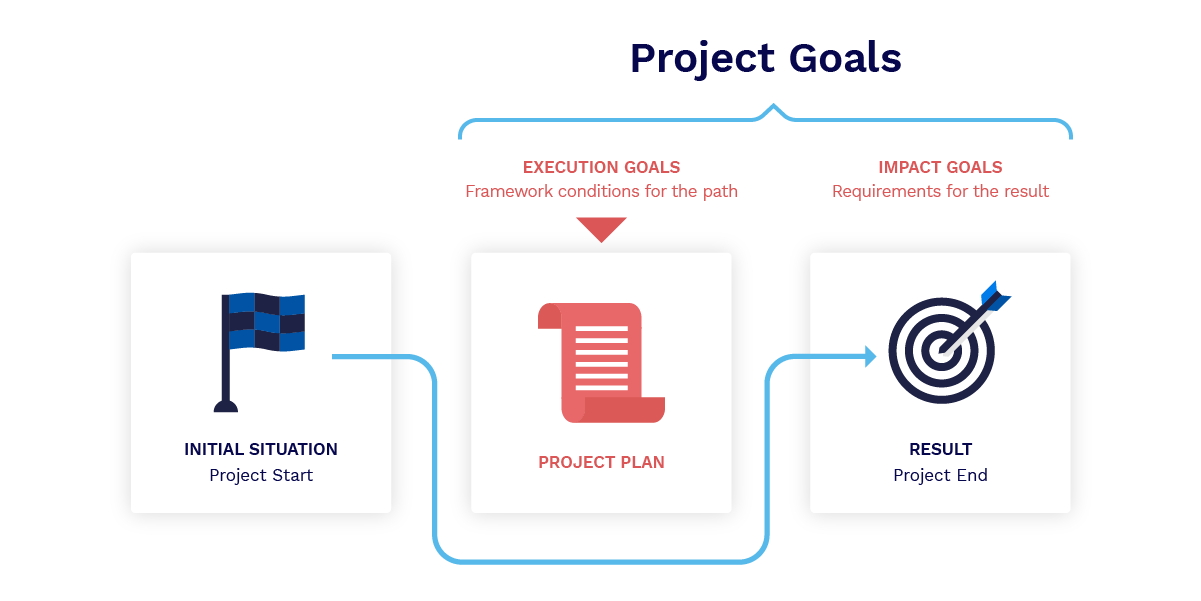Project management | Methodology
Why are you planning at all?
Everyone talks about project planning. "The project manager is responsible for planning." - "The planning is out of date." - "We're two weeks behind schedule." But have you considered why you do planning in the first place? What is the purpose of a project plan? This article aims to shed some light on these seemingly mundane questions.
Author : Dr. Daniel Hösli | Last updated: 29. Apr 2023 | 5 minutes read

What does Wikipedia say about it? Quote (translated): A project is a goal-oriented, one-time undertaking that consists of a set of coordinated, controlled activities with a start and end date and is carried out in order to achieve a goal while taking into account specifications regarding time, resources (for example, financing or costs, production and working conditions, personnel and operating resources) and quality. Another article states that planning is the mental anticipation of future action by weighing various alternative courses of action and deciding on the most favorable path.
So there you have it: a project plan is intended to achieve a goal. And this under consideration of specifications such as time and resources. The last point is essential. If we don't have any targets for achieving a goal, then we probably don't need a plan. We need a plan if we want to use the limited resources available to achieve a goal as soon as possible or at least within a reasonable period of time. The plan therefore tells us how we want to proceed in order to achieve the goal and at the same time comply with the given framework conditions. A mathematician would probably call this an optimization problem: "Given a goal and certain resources. How can I achieve the goal as quickly as possible with them?"
Practice is more complex than theory...
Now, in fact, of course, it is much more complicated. The project goal is not simply "to build a tree hut". And the resources available are not simply "a few kids working along until the goal is achieved and then a 100-franc bill for some building materials, hammer and nails." Many projects in the everyday life of companies are more complex by dimensions. Resources are people with work schedules, absences and skills. Material has to be evaluated, ordered and checked. Money is budgeted and requested through approval processes. And the goals are often extensive lists of requirements, which can change again and again over time - in the best case controlled by a change management, or sometimes spontaneously and uncontrolled...
...and not all goals are the same!
Let's take a closer look at project goals. Project goals can be divided into two categories on an abstract level (and it is worth doing this in every project at the latest during initialization):
- Impact goals: What should the project ultimately achieve? What should be the final result or deliverable?
- Execution goals: How are the impact goals to be achieved? Which framework conditions have to be considered during the project execution?
So, the execution goals are not about the end state (result) but about the way to get there. And it is precisely these types of goals, the wind-down goals, that lead us to create a project plan. In particular, it is the time constraints ("The project must be completed by the end of the year") as well as the limited resources available ("There are 3 people from department X at 20% each and a budget of CHF 450,000") that make us draw up a plan that describes the best possible way to achieve the result - taking into account the available resources.
What is the best planning methodology?
The project plan is a process model that takes all framework conditions into account. The milestones represent intermediate targets and end dates, at which results are available in each case. Which planning methodology is used is a question of the defined project management principles and the corporate culture. This can be planning with work breakdown structures (WBS) and Gantt, or network planning techniques, Goal-Directed Project Management (GDPM), but also Scrum or Extreme Programming. Here, an organization must consider which methodology best fits the company's circumstances. The following points should be considered (without claiming to be exhaustive):
- How dynamically do the framework conditions (possibly also the impact goals!) change in a project?
- How strongly are our projects interdependent?
- How important is the adherence to deadlines in the project?
- What are the demands of the stakeholders, especially the client or sponsor?
Based on such questions, an organization must find the best possible planning methodology for it. This must often also result from trial-and-error phases. One often comes to the conclusion whether a methodology is suitable or not only after applying it in several projects. Experience values are usually much more important here than a method evaluation based on theoretical decision criteria. The methodology used only emerges in the course of time and after experience from various projects. And sometimes it is not exactly the planning methodology XY according to the textbook, but rather a modified form of it for the own needs. And that is also a good thing.
With this article, I do not want to question whether project planning is necessary at all. Every sensible person (including project managers) plans a complex project and does not simply approach a matter haphazardly. I would rather like to raise awareness of what such a project plan is good for. It helps us to think about how we want to proceed in order to achieve certain impact goals while taking the execution goals into account. And you have to think about this again and again during the course of the project. Because things change constantly, sometimes even the goals!
About the author
Dr. Daniel Hösli is Managing Director and Lead Consultant at INTRASOFT AG, whose SaaS solution PQFORCE is the leading platform for agile, project-oriented business management. He has been involved in the development of project management systems on a daily basis for 15 years in a consulting and project management capacity - both organizationally and technically - and thus has the experience from countless contacts and tasks from a wide variety of companies and different management levels.










